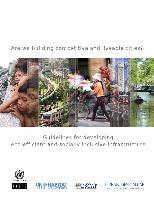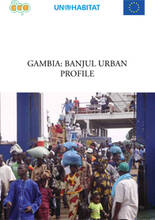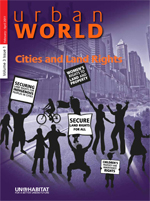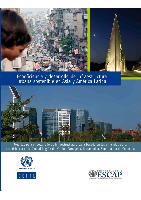Location
UN-Habitat is the United Nations programme working towards a better urban future.
Its mission is to promote socially and environmentally sustainable human settlements development and the achievement of adequate shelter for all. Cities are facing unprecedented demographic, environmental, economic, social and spatial challenges. There has been a phenomenal shift towards urbanization, with 6 out of every 10 people in the world expected to reside in urban areas by 2030. Over 90 per cent of this growth will take place in Africa, Asia, Latin America, and the Caribbean. In the absence of effective urban planning, the consequences of this rapid urbanization will be dramatic. In many places around the world, the effects can already be felt: lack of proper housing and growth of slums, inadequate and out-dated infrastructure – be it roads, public transport, water, sanitation, or electricity – escalating poverty and unemployment, safety and crime problems, pollution and health issues, as well as poorly managed natural or man-made disasters and other catastrophes due to the effects of climate change. Mindsets, policies, and approaches towards urbanization need to change in order for the growth of cities and urban areas to be turned into opportunities that will leave nobody behind. UN-Habitat, the United Nations programme for human settlements, is at the helm of that change, assuming a natural leadership and catalytic role in urban matters. Mandated by the UN General Assembly in 1978 to address the issues of urban growth, it is a knowledgeable institution on urban development processes, and understands the aspirations of cities and their residents. For close to forty years, UN-Habitat has been working in human settlements throughout the world, focusing on building a brighter future for villages, towns, and cities of all sizes. Because of these four decades of extensive experience, from the highest levels of policy to a range of specific technical issues, UN-Habitat has gained a unique and a universally acknowledged expertise in all things urban. This has placed UN-Habitat in the best position to provide answers and achievable solutions to the current challenges faced by our cities. UN-Habitat is capitalizing on its experience and position to work with partners in order to formulate the urban vision of tomorrow. It works to ensure that cities become inclusive and affordable drivers of economic growth and social development.
Members:
Resources
Displaying 151 - 155 of 224Are we building competitive and liveable cities?: Guidelines for developing eco-efficient and socially inclusive infrastructure
This guideline jointly published by The UN Economic and Social Commission for Asia and the Pacific (ESCAP), the UN Economic Commission for Latin America and the Caribbean (ECLAC), and the UN Human Settlements Programme (UN-HABITAT), in partnership with the Urban Design Lab of the Earth Institute, Columbia University, provides practical tools for city planners and decision makers to reform urban planning and infrastructure design according to the principles of eco-efficiency and social inclusiveness.
image Gambia: Banjul Urban Profile
The Banjul Urban Profiling consists of an accelerated, action-oriented assessment of urban conditions, focusing on priority needs, capacity gaps, and existing institutional responses at local and national levels. The purpose of the study is to develop urban poverty reduction policies at local, national, and regional levels, through an assessment of needs and response mechanisms, and as a contribution to the wider-ranging implementation of the Millennium Development Goals.
Urban World: Cities and Land Rights (Volume 3 Issue 1)
Land is a scare resource involving a wide range of rights and responsibilities. When poorly managed, it can become contentious often leading to disputes, conflict, degradation and other problems, all of them drivers of slum development and poverty in urban areas.
In this issue of Urban World:
Ecoeficiencia y desarrollo de infraestructura urbana sostenible en Asia y América Latina: medidas para el desarrollo de infraestructura urbana basada en los principios de la ecoeficiencia en la Ciudad Región del Caribe, Cartagena, Barranquilla y Santa ...
El propósito de este análisis ha sido la revisión actualizada de los conceptos, criterios y prácticas que se aplican en las principales ciudades y territorios del Corredor Caribe colombiano (las ciudades distritos de Santa Marta, Barranquilla y Cartagena, y el departamento del Magdalena en su franja de Corredor), en relación con los procesos ambientales y de ecoeficiencia asociados al desarrollo de infraestructuras de servicios.
Ecoeficiencia y desarrollo de infraestructura urbana sostenible en Asia y América Latina: revisión de las prácticas vigentes y los criterios utilizados para integrar aspectos ambientales y sociales en la infraestructura urbana de Chile, Colombia y México
El objetivo del presente documento es hacer una revisión de las prácticas vigentes y de los criterios utilizados para integrar aspectos ambientales y sociales en el proceso de desarrollo de infraestructura en ciudades escogidas de América Latina, específicamente en Chile, Colombia y México, con el objeto de identificar y evaluar las fortalezas y debilidades de las acciones emprendidas.





